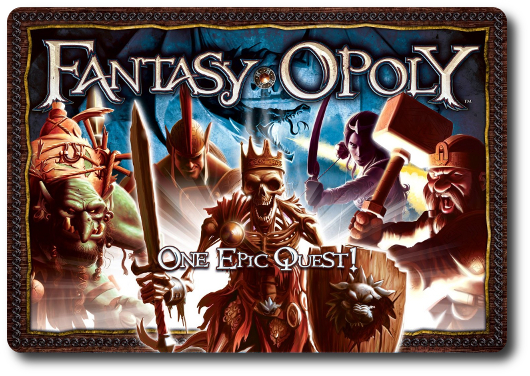
The Basics:
- For ages 8 and up
- For 2 to 6 players
- Approximately 120 minutes to complete
Geek Skills:
- Active Listening & Communication
- Counting & Math
- Logical & Critical Decision Making
- Reading
- Pattern/Color Matching
- Strategy & Tactics
- Risk vs. Reward
- Hand/Resource Management
Learning Curve:
- Child – Easy
- Adult – Easy
Theme & Narrative:
- Fantasy meets Monopoly
Endorsements:
- Gamer Geek rejected!
- Parent Geek mixed!
- Child Geek approved!
Overview
Monopoly began showing up on gaming tables as early as 1933 and continues to be produced using different themes. You can now play Monopoly that depicts Alpacas and even bacon. Within the gaming community, Monopoly is quietly respected as a means into the hobby, but little else. The newest addition to the themed Monopoly family whisks us away to a realm of fantasy and high mortgage rates.
Fantasy-Opoly, published by Late for the Sky Productions, consists of 1 game board, 22 Property cards, 4 Element cards. 2 Magic cards, 14 Destiny cards, 14 Fate cards, 6 metal Player pieces, assorted property upgrades, 2 standard-six-sided dice, and a large assortment of play money (in values 1, 5, 10, 20, 50, 100, and 500). The game board is thick and sturdy, with colorful images of fantasy creatures. The cards are thick, durable, and slightly larger than your average playing card. The upgrade pieces are plastic, but the Player pieces are solid metal and sculpted to look like various artifacts found in a fantasy setting (knightly helms and magic potions, for example). The play money is made of thin paper and not very durable at all. Expect to crease more than one bill while playing the game.
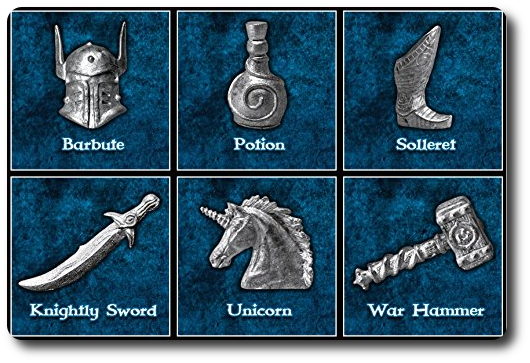
The Player pieces
Preparing the World
To set up the game, allow each player to select 1 Player piece and set it off to the side, next to the “Quest” space on the game board.
Second, shuffle the Destiny and Fate cards, placing them face-down on their designated spots on the game board.
Third, determine who will be the Banker and give them all the money and the rest of the cards. Each player (including the Banker) receives $1,630,00 worth of play money. The Banker will be in charge of making change, collecting fees, and distributing the Element, Magic, and Property cards.
Fourth, place the upgrade pieces off to one side and within easy reach of all the players.
That’s it for game set up. Determine who will go first and begin.
Trekking Across the Realm
Fantasy-Opoly plays just like Monopoly. As such, I will not go into great detail about how the game is played. I will, however, summarize the different game components.
The Game Board
The game board hosts a menagerie of fantasy creatures, both benign and horrific. None of them pose a threat to the player, nor will they interact with them, either. Each fantasy creature represents a property that can be purchased. An imaginative individual can pretend that the Property card represents a victorious battle or a sly transaction of power. In either case, the game board is loaded with fantasy beasties, including opportunities to test fate, challenge destiny, and buy property at a legit cost. High adventure has been replaced with the quest for high profits.
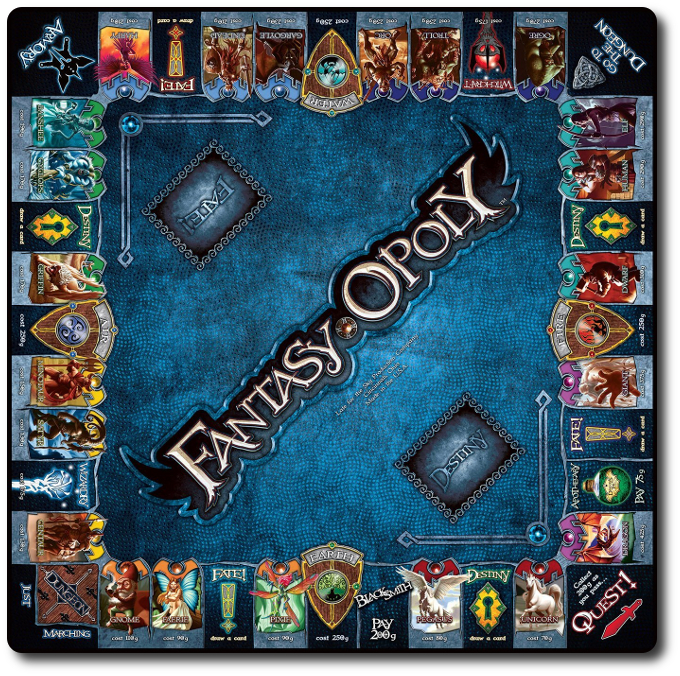
Any play money that is collected and is not meant to pay for rent or purchasing of Property cards is placed in the middle of the game board. This area is referred to as the “Armory”. There is a space found on the outside borders of the game board that is also named the Armory. When a player lands on this space, they collect all the play money currently in the middle of the game board.
The Dungeon is a special space on the game board that temporarily holds a Player piece until such time the owning player rolls doubles (allowing them to leave) or pays for release (placing the play money in the Armory). If a player stops on the Dungeon space, they are considered “just visiting” and are not held. However, if the player is sent to the Dungeon, there they will stay until luck or fortune releases them. While chained to the Dungeon wall, the player can still bid on property
The Quest space found on the game board is the entrance to the game and a marker. When a player passes the Quest space, the Banker awards them $200. Players can also earn money through cards, charging opponents fees for landing on their property spaces, and selling their properties to an opponent by way of negotiation. If the player is really desperate, they can mortgage their Property card. This allows the player to take out a loan from the Banker, providing much-needed cash. Until the loan is paid off (at 10% interest), the player’s property will not earn any play money.
Property Cards
The Property cards depict various fantasy creatures. Everything from orcs to dragons can be found on the game board. The space the fantasy creature is on has a matching Property card. Like Monopoly, the goal is to collect as many Property cards as possible to make it financially impossible for your opponents to travel around the game board. When a player wants to purchase a Property card, they pay the Banker and claim the card. There is no combat to speak of, but the back of the Property card summarizes the creature if the player wants to learn more about it. When an opponent lands on a space the player owns, they obtain money from their opponent.
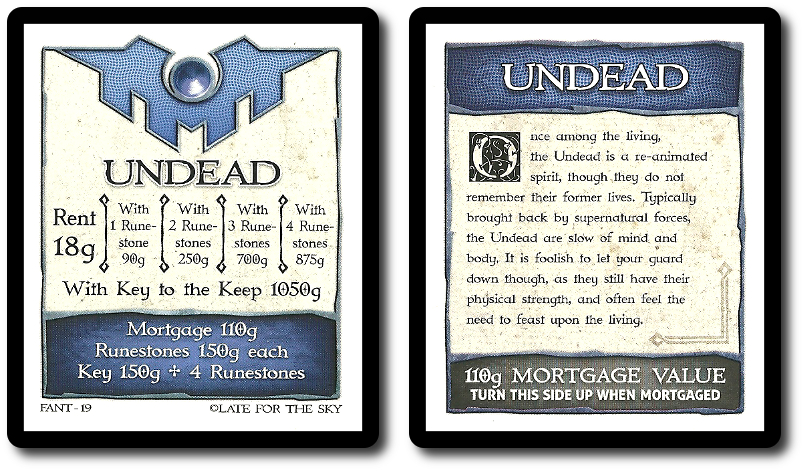
A player is never forced to purchase a Property card. Indeed, it’s often wiser to wait until the Property card is affordable so as not to risk being financially strapped. If the player chooses to pass on the Property purchase, all of the player’s opponents can now bid on the same property. The bidding begins at the current Property price and continues until no other player can beat the current highest bid.
If the player has all the Property cards of a specific group (based on color), they may upgrade it. The upgrade pieces are small cubes (representing runestones) and keys (representing keeps). This upgrade is referred to as “development” and increases the amount the player can charge when an opponent lands on a space they own. Upgrade components are a limited resource, meaning the player cannot purchase an upgrade unless there is one available.
Destiny and Fate Cards
These cards replace the traditional Community Chest and Chance cards. They are used in the game in the exact same way, with the player drawing a card when they land on a spot on the game board. The card is immediately drawn, read out loud, and resolved. Once resolved, the card is placed at the bottom of the deck from which it was drawn. Destiny and Fate cards will not cause a player to win or lose the game, but they can provide the player a small windfall or minor setback.
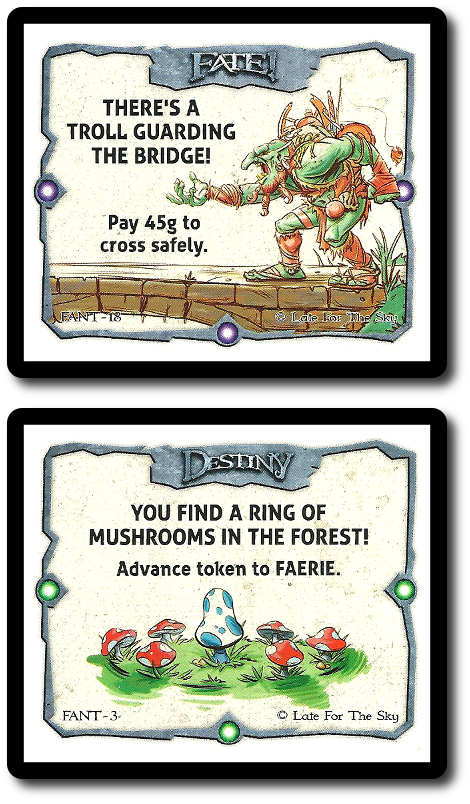
The Elements and Magic
The Element cards have replaced the traditional game’s railroads. Instead of locomotives, players can invest in the elements of Fire, Earth, Water, and Air. Only owning 1 is seldom a good investment, especially when the fee to visiting opponents is much higher if the player collects all the “Element” Property cards.
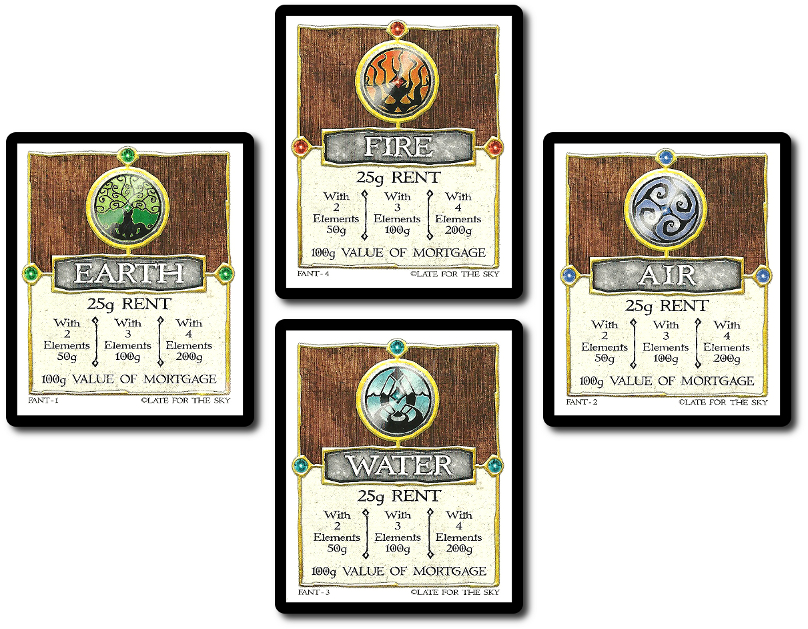
The Magic cards represent Witchcraft and Wizardry. These two cards replace the traditional game’s Electric Company and Water Works. Their purchase price is fixed, but not the return in their investment. When an opponents lands on the space owned by the player, they roll dice to determine how much their opponent owes. If the player is adept in both Witchcraft and Wizardry, the price for trespassing could be very expensive.
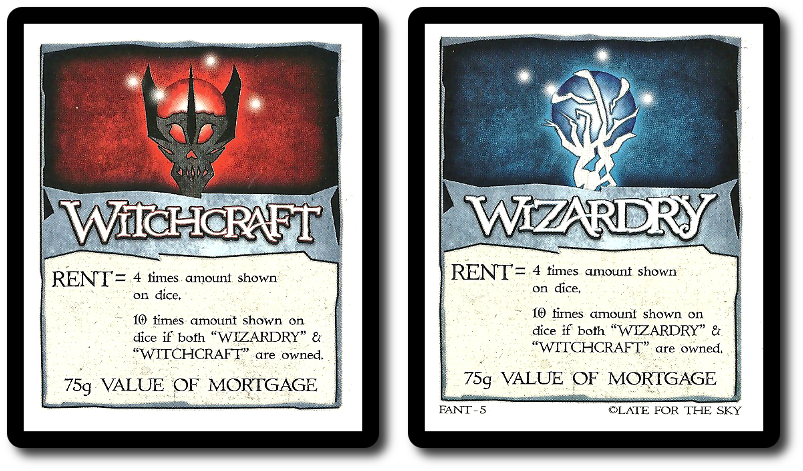
Heroes of the Realm
The game continues with players rolling dice, moving around the game board, purchasing property, and exchanging play money until the price to play starts to get too expensive. At anytime a player is required to pay money, but cannot, nor do they have the means to get a loan, they are out of the game. They are considered “Bankrupt”. When only 1 player is left in the game, they are declared the winner, even if they are only worth $1.
Game Variant
The game can be shortened by providing each player 4 random Property cards, which is paid for before the game begins. The players now start the game as property owners, but also have different amounts of play money. The total length of play is set to 1 hour. After the hour has passed, each player determines their total value by counting property, upgrades, and play money. The player who is worth the most wins the game.
To learn more about Fantasy-Opoly, visit the game publisher’s web page.
Final Word
The Child Geeks liked the game’s artwork and the many different fantasy creatures. We didn’t have to teach the game, since all of our players were familiar with Monopoly. The only aspect of the game that we had to go over was a few of the different names for common game components. After that, the Child Geeks were up and running. According to one Child Geek, “It’s Monopoly with monsters. It’s OK, I guess. I’d rather play this version than the regular version.” Another Child Geek said, “I don’t think it’s any different from the other Monopoly games I’ve played, but it looks different. That’s fun.” When the games were over, the fantasy aspect of the game didn’t win anyone over who didn’t already like Monopoly.
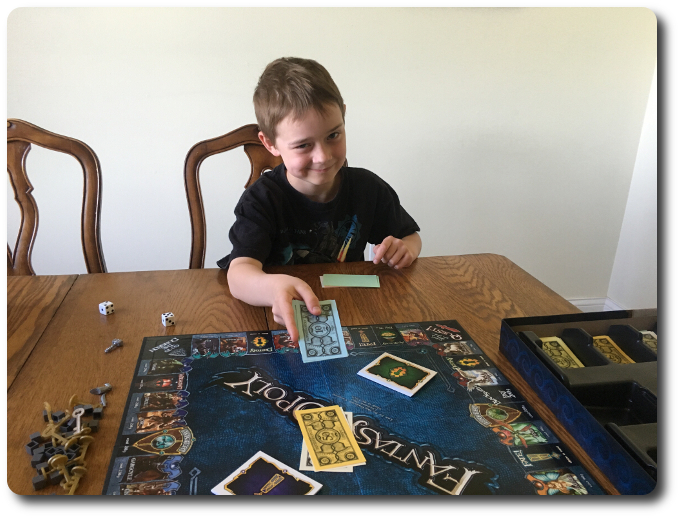
It might be fantasy themed, but I take my rent collecting seriously
The Parent Geeks found the game’s theme to be interesting, but unimportant. As one Parent Geek put it, “The game has a heavy fantasy presence, but when you start playing it, you realize it’s wafer thin. This is just Monopoly.” The Parent Geeks did appreciate the fact that the game was using a theme that wasn’t about dogs or state capitals, but didn’t believe it did much good, either. According to one Parent Geek, “A good idea, but I think they missed the boat here. They could have changed terms and actions to sound more fantasy like.” In short, the Parent Geeks were not disappointed with the Monopoly game, but didn’t think the game as a whole was that interesting. Fantasy-Opoly was just Monopoly and it had little to provide that was new or interesting, but nor did it sour the game for those who enjoyed it.
The Gamer Geeks were not impressed. Not impressed at all. According to one Gamer Geek, “What a waste of components. They could have really done some great things here with the game but totally failed. I would feel insulted if I didn’t know this was Monopoly trying to look cool.” Another Gamer Geek said, “Themed games are always hot around Christmas and as gag gifts, but I was hoping for something special here. Sadly, it’s just Monopoly with fantasy creatures and not much else. I’d give this one a pass.” In some ways, the Gamer Geeks’ disappointment was due to their expectations not being met, having little to do with the game itself. In fact, all the Gamer Geeks agreed that Fantasy-Opoly played just fine. What they didn’t like was that they were playing Monopoly.
I was disappointed with the game. I felt it had a great opportunity to take the traditional Monopoly formula and spin it in a way that was new and interesting. Alas, this was not the case. The “fantasy” portion of the game focuses on the fantasy creatures depicted on the game board, some text that discusses them, and a few game components. Everything else is pure Monopoly, from the use of thin paper money to paying rent to opponents. None of this was a problem, game mechanic wise, but it never felt right. It’s very strange to buy a Dragon, for example, and then charge rent when a player lands on it. Dragons want to eat you, not nickel-and-dime you.
What we have here is not a fantasy Monopoly game. This is a Monopoly game with a very weak fantasy theme pasted on it. You will not raid castles, rescue princess, or quest for magical items. What you will do is buy property, collect rent, and continually make change with the Banker in hopes of financially outlasting your opponents. Which has nothing to do with fantasy, but everything to do with Monopoly.
The game is pretty to look at and the Player pieces are excellent, but the game’s theme and the game play never, ever connect. It’s like bumping into a birthday clown at a funeral. Awkward. The game almost feels like two different experiences attempting to get along. The first is the game itself that just wants you to get down to business and invest heavily in property. The other half wants you to think about high fantasy and travel the realm (read: the game board) to “slay” (which is to say “buy”) fantasy creatures.
Themed Monopoly games are everywhere. I have always viewed them as a novelty and I have not experienced anything with Fantasy-Opoly that changed my mind. It’s still Monopoly, but wearing a costume. The game isn’t fooling anyone, but the game’s theme on the box is terribly misleading. Make no mistake, if you enjoy Monopoly, you’ll enjoy Fantasy-Opoly. If you are a fan of fantasy, but don’t care much for Monopoly, then this is one adventure you do not want to go on.
This game was given to Father Geek as a review copy. Father Geek was not paid, bribed, wined, dined, or threatened in vain hopes of influencing this review. Such is the statuesque and legendary integrity of Father Geek.



